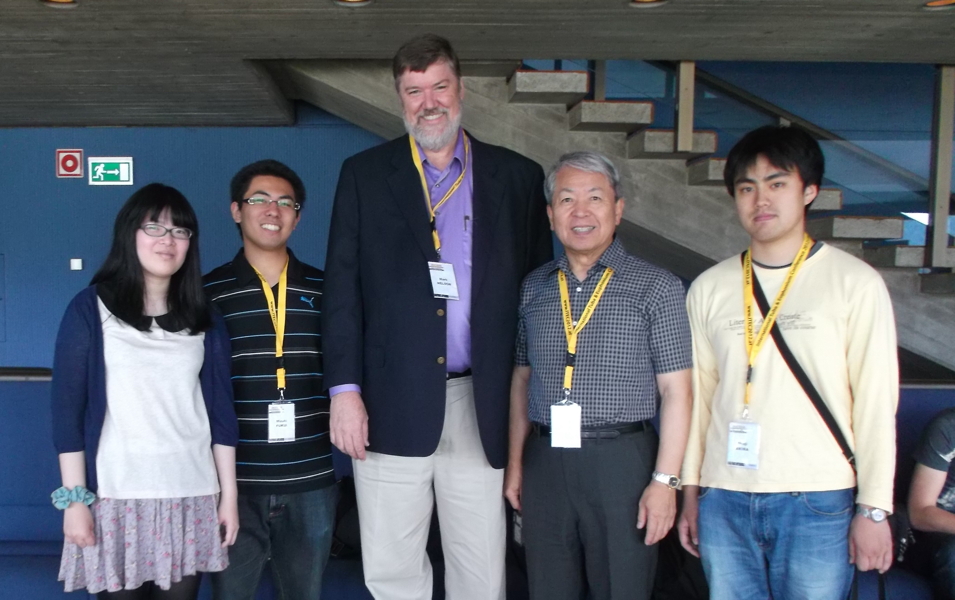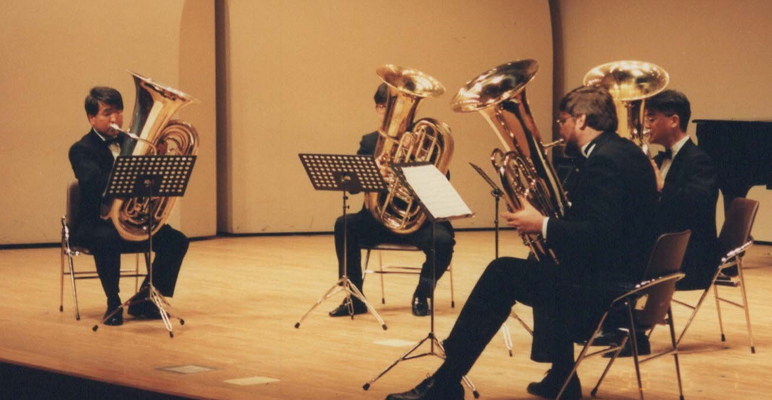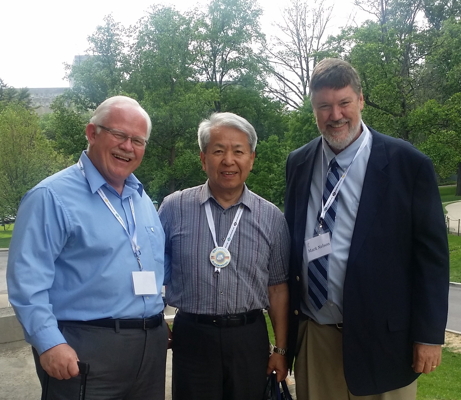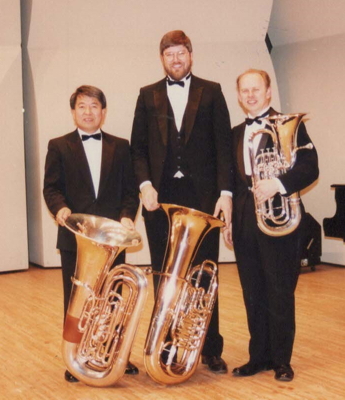Tel: +1 469 836 2108 | Email : drobnakbrass@gmail.com | Login
Chitate Kagawa (b. 1944)
Established the Hokkaido Euphonium Tuba Association (HETA) in 1981, host first conference abroad (1990 - Sapporo)
Biography
Chitate Kagawa (b.1944) was born March 20th 1944 to Mitsuo Kagawa, an elementary teacher, and his wife Kiyoko in Hokkaido, northern Japan. He started playing the tuba in junior high school. After graduation from Asahikawa Higashi high school he entered a band of the local Grand Self Defense Forces. He was soon invited to play tuba in the Grand Self Defense Force Central Band in Tokyo for two years. Meanwhile, he began private tuba studies with Genkichi Harada, tubist with the NHK Symphony Orchestra. He soon passed an examination and entered the Tokyo University of Fine Arts & Music. He graduated from Tokyo University of Fine Arts & Music in 1969. That same year he met and married his wife Sachiko, and he joined the Sapporo Symphony Orchestra as principal tuba, from which he retired after 35 years of service in March 2004.
In 1971 Chitate founded the Sapporo Wind Band and served as its conductor for eight years. Chitate gained credentials and respect as an adjudicator in Japan, serving as judge of many wind competitions in Hokkaido prefecture. More recently, he served as instructor of tuba and euphonium at the Hokkaido University of Education and Ohtani College.
Chitate was also a founding member of the Hokkaido International Music Exchange Society and a councilor for the International Tuba Euphonium Association (ITEA). In September 1973 Chitate was selected and sponsored by the Cultural Affairs arm of the Japanese government as the first Japanese brass instrument player to study abroad for one year. He studied tuba under Professor Harvey G.Phillips at Indiana University.
In June 1981, Chitate established the Hokkaido Euphonium Tuba Association (HETA) both to increase awareness of these instruments in Japan and to encourage pride in their performance. In August 1981 he presented the first tuba/euphonium camp in Sapporo. Since 1985, he has invited outstanding international tuba and euphonium artists to teach at the camp. The instruction and activities at the camp have inspired young musicians and produced outstanding performers, such as Koji Suzuki, tubist of the Kyushu Symphony Orchestra, and Ryoichi Tamaki, tubist of the Sapporo Symphony Orchestra and inheritor of this camp. The camp's competition for student tuba players was named the Harvey G. Phillips Solo Tuba Competition. In 2010, at Mr.Phillips' suggestion the competition was re-named "The Harvey G. Phillips and Chitate Kagawa Solo Tuba Competition". The camp also hosts the Brian L. Bowman Solo Euphonium Competition.
Since 1988, he and his wife have operated the Japan Tuba Center to serve the needs of euphonium and tuba players for instruments, mouthpieces, accessories, music, and recordings.
In Sapporo in 1990, the city government sponsored an international Tuba- Euphonium Conference which was an unprecedented success. Five hundred and ten people from Japan and 14 other countries participated. Chitate was chief of the program committee and Harvey Phillips was consultant to the mayor's committee. This conference has been praised in many countries and continues to be a model for more recent symposia.
Chitate Kagawa's work throughout his career has served to inspire greater interest in and awareness of tuba/euphonium music in Japan, and has also helped to further this awareness in other countries.
Mr. Kagawa received the Lifetime Achievement Award at the International Tuba – Euphonium Conference held at The University of Arizona in 2010.
-Jerry Young

Chitate Kagawa with some of his students and Mark Nelson at ITEC 2012 Linz, Austria
Chitate Kagawa was born on March 20th 1944 in Hokkaido, Japan. He started playing tuba in junior high school. After graduating high school, he was admitted into the Grand Self Defense Force Central Band in Tokyo. He began private tuba study and soon was accepted as a student of the Tokyo University of Fine Arts and Music, graduating in 1969. That same year he joined the Sapporo Symphony Orchestra as principal tuba. He retired from this position in March 2004.
In 1971, Chitate founded the Sapporo Wind Band and served as its conductor for eight years. More recently, he served as instructor of tuba and euphonium at the Hokkaido University of Education and Ohtani College, and was also a founding member of the Hokkaido International Music Exchange. In September 1973, he was selected and sponsored by the Cultural Affairs branch of the Japanese government to be the first Japanese brass instrument player to visit the United States. He studied tuba under Professor Harvey G. Phillips at Indiana University.
In June 1981, Kagawa established the Hokkaido Euphonium Tuba Association (HETA) to increase awareness of these instruments in Japan. In August 1981, he created the first tuba/euphonium camp in Sapporo. Since 1985, he has invited outstanding international tuba and euphonium artists to teach at the camp. Thanks to Chitate Kagawa’s influence and efforts, generations of young Japanese musicians have benefited through his presenting and teaching at a record number of twenty-six camps. He was able to introduce new forms of tuba/euphonium music to literally thousands of people.
For over thirty years, Chitate and his wife Sachiko have operated the Japan Tuba Center providing euphonium and tuba players with instruments, mouthpieces, accessories, music, and recordings. The Japan Tuba Center became an important institution in Japan, presenting an extensive and carefully maintained catalogue of publications and recordings for euphonium and tuba.
In 1990, the Sapporo city government sponsored an incredibly successful International Tuba-Euphonium Conference. 510 people from Japan and 14 other countries participated in this world-class event. This conference has been praised throughout the tuba-euphonium world and continues to be a model for more recent symposia.
Chitate Kagawa’s work over the past thirty-six years has served to inspire greater interest in and awareness of tuba/euphonium music in Japan. His determination has given young Japanese players the opportunity to learn from some of the best performers in the field, and his dedication to music instruction benefiting future generations has made him a most deserving recipient of this ITEA Lifetime Achievement Award.
-2010 International Tuba Euphonium Conference Program

Tuba Quartet at 1993 Hokkaido Euphonium Tuba Camp

Chitate Kagawa with Marty Erickson and Mark Nelson

